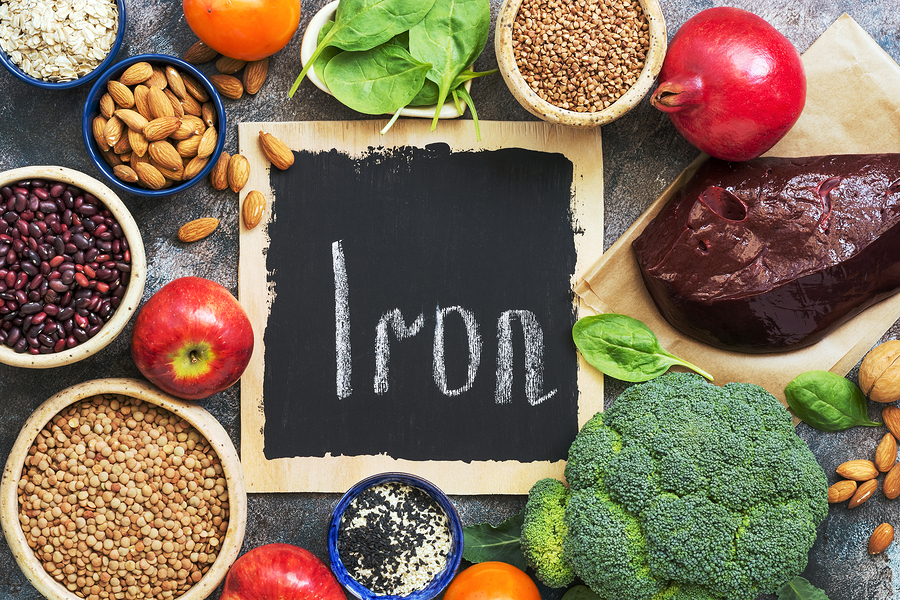When it comes to maintaining optimum nutrition, there are several different aspects to pay attention to. The body requires a wide range of vitamins and minerals in order to function at its best. One essential mineral that we should all consume adequate amounts of is iron!
The Role of Iron
The primary role of iron in the body is to enable the transportation of oxygen via our red blood cells. Without this effective transportation of oxygen, the cells of the body would be unable to produce energy. The presence of iron in the body also helps to remove carbon dioxide.
Although it is important that everybody gets enough iron in their diets, it is especially important for babies as it is essential for brain development and growth at this age. If a baby doesn’t weigh a healthy weight when they are born then their healthcare professional may suggest that they take an iron supplement for the first few months of their life. It is normal to expect that formula for babies will be fortified with iron.
How Much Iron?
It is generally recommended that men over the age of 18 consume 8.7mg of iron per day. Women aged between 19 and 50 should aim for 14.8mg of iron per day, and women over the age of 50 should consume 8.7mg per day.
If there is too much iron in your diet, or you are over-doing it by taking too many iron supplements, then you may find that you suffer with constipation, feelings of sickness, stomach pains, and vomiting. More than 17mg of iron each day is considered to be too much.
Iron Deficiency
If there isn’t an adequate amount of iron in the body then our red blood cells can become unable to efficiently carry oxygen around the body. When this happens a condition knwon as iron deficiency anemia can present.
Symptoms of iron deficiency anemia can include fatigue and general weakness of the body, as well as dizziness, headaches, and pale skin. It can also become much harder to maintain body temperature.
If you eat a varied and balanced diet then it is unlikely that you will become deficient in iron. However, adolescent girls and some women may find it harder to consume the recommended amount on a daily basis. This is mainly a concern amoungst those who are capable of becoming pregnant.
Treatment for Iron Deficiency
When it is determined by a healthcare professional that there is a necessity for treatment for iron deficiency, then there are generally two main approaches.
A simple treatment option is to add supplements to the diet. This is something that can be done daily without too much consideration. Iron levels can then be monitored to determine if this treatment option has been successful.
Alternatively, changes can be made to the diet to ensure that an ample amount of iron is being included in the diet each day.
Different Types of Iron
There are two different types of iron in food.
Heme Iron
Heme iron is found in foods that are animal products, such as meat, poultry and seafood. Heme iron is generally better absorbed by the body than non-heme iron.
Non-Heme Iron
Non-heme iron is found in plant-based foods, such as grains, beans and spinach. Some foods, such as bread and cereals, are also fortified with iron and still considered to be non-heme.
Some experts suggest that in order to increase the absorbability of non-heme iron foods, that they should be eaten with animal products. If this is not an option due to a vegetarian or vegan diet, then it is a good idea to eat non-heme iron foods with foods that contain high levels of vitamin C.
Good sources of vitamin C are bell peppers, kiwi, lemon, Brussels sprouts, broccoli, sweet potato, cabbage, tomatoes, and leafy greens.
Dietary Sources of Iron
Some of the very best dietary sources of iron are:
- Meat
- Nuts
- Beans
- Dried fruit
- Dark green leafy vegetables
- Wholegrains
Nutrition for Healthy Living
Paying attention to your diet in order to get enough of all of the vitamins, minerals that your body needs is one of the best things that you can do to protect your health.
If you are not eating a healthy diet that contains a range of the nutrients that your body needs, then it will be unable to function as effectively as it could! Not only could this impact your long-term health, but also the way you feel during each and every day. Your mood and energy levels can be the most obvious things to be affected, and this can have a huge impact on how you live your life.
Check out some more simple advice from Onto Orthopedics on Nutrition Basics!
References
1. https://www.eatright.org/food/vitamins-and-supplements/types-of-vitamins-and-nutrients/iron
Related Posts
Cigarettes May Inhibit Inflammation Treatments
Axial spondyloarthritis, also known as AxSpa, is a chronic…








